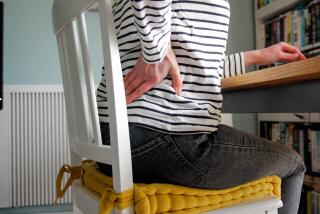We Haven’t Got Time for the Pain
- Share via
Women are more sensitive to pain than men but are better able to cope with it, new research suggests. Men are more likely to let the discomfort sour their mood and, in the long run, suffer more. Women take measures to relieve the discomfort; men tend to wait, get ambushed by pain, then cope with it poorly. Their pain is our gain. Two Times columnists square off on the topic. And they pull no punches. Ouch.
*
My editors wanted a funny column, a takeoff on recent scientific findings that women feel pain more acutely than men but respond to it more competently.
But I find it hard to joke about pain these days, being knee-deep in it and all.
I busted my knee on the basketball court three weeks ago. It was the worst pain I’ve felt since childbirth--and for the uninitiated, that’s about a 15 on a 10-point Richter scale of pain--and I’ve been relying on my superior female coping skills ever since.
Torn anterior cruciate ligament, strained meniscus cartilage, hairline fracture of the tibia--the same type of injuries suffered by UCLA’s Baron Davis the week before, when he landed badly after a slam dunk in an NCAA tournament game.
But he’s a man, and I’m a woman.
So I screamed when the ligament popped, then writhed around on the court and cried. (I am feeling this acutely.) I allowed my teammates to carry me from the floor and apply ice to my throbbing knee. (Seeking support from others--a sign of healthy emotional coping, according to the research reported to the National Institutes of Health.) I sobbed and prayed for the pain to stop as I sat on the bench and watched the game go on. (The female tendency to find comfort in emotional release.)
Then I limped out of the gym, loaded my kids in the car and drove home . . . stopping at the grocery store en route. That night, I cooked dinner, did laundry, helped with homework, washed and put the dishes away . . . then dragged my aching leg upstairs to an ice pack in bed and a sleepless night.
Baron Davis didn’t cry--at least not in public--when he hurt his knee. He limped back on defense, came out of the game briefly, then went in to play five minutes more before succumbing to pain and the team doctor’s orders that he rest the knee. (Manly stoicism on display.)
But when he got back to the dorm that night, I don’t suppose he tended to anyone’s needs but his own: Put the knee up on ice, kick back with a cool drink, watch TV till you fall asleep.
It’s another revelation from the world of scientific research best fitting into the category tell-me-something-I-already-know: researchers meeting at the NIH conference this week discovering that women are more sensitive to pain than men.
Meaning when something hurts, it hurts us more.
But we are better able to cope, they said, and recover more quickly. And we are less likely to let pain disrupt our lives.
It took a battery of tests on hundreds of subjects, years of research and reams of data for the scientists to figure this out.
They could have asked any woman who’s ever lived with a man and nursed him through a head cold, stomach pains, toothache, flu. . . .
I’ve never known a woman to take to bed with the sniffles; to spend entire days guzzling orange juice, watching talk shows and reading old copies of Sports Illustrated, as if she were at death’s door because she had a runny nose. And I’ve never known a man who didn’t.
*
The researchers blame hormones for women’s increased sensitivity to pain--estrogen stimulates nerves, testosterone raises the threshold of pain. That, they say, gives us a head start in dealing with it.
And they attribute our greater resiliency to better coping strategies. Women, they say, regard pain as a “call to action” and mobilize resources to limit the discomfort.
Men, they say, use fewer coping skills when the pain begins, so, in the long run, suffer more and are more likely to let pain disrupt their mood.
After a day of arthritis pain, one researcher said, “men have a greater carry-over of negative mood. Women are less likely to report a negative mood” because of pain.
Well, in my house, there’s been plenty of “negative mood” lately, as I hobble around, waving my crutches at any child or dog who dares get in my way. By the end of the day, I’m yelling at the kids, screaming at the dog, getting into arguments with friends on the phone.
But that doesn’t make the chores go away. Pain or not, I still have to get kids up in the morning and ready for school, to summon up sympathy for their complaints, to make sure they have food and clean clothes, and help them learn their multiplication tables.
Women don’t let pain disrupt their lives not because of any special “coping strategies,” but because we can’t; because too many people are relying on us to do the things we always do.
And for most of our lives--from puberty at least--women deal with pain in some form or another on a regular basis . . . say, once a month. We learn that it comes, and it goes. That it hurts like heck . . . but, hey, life goes on.
* Sandy Banks’ column is published Mondays and Fridays. Her e-mail address is sandy.banks@latimes.com.


